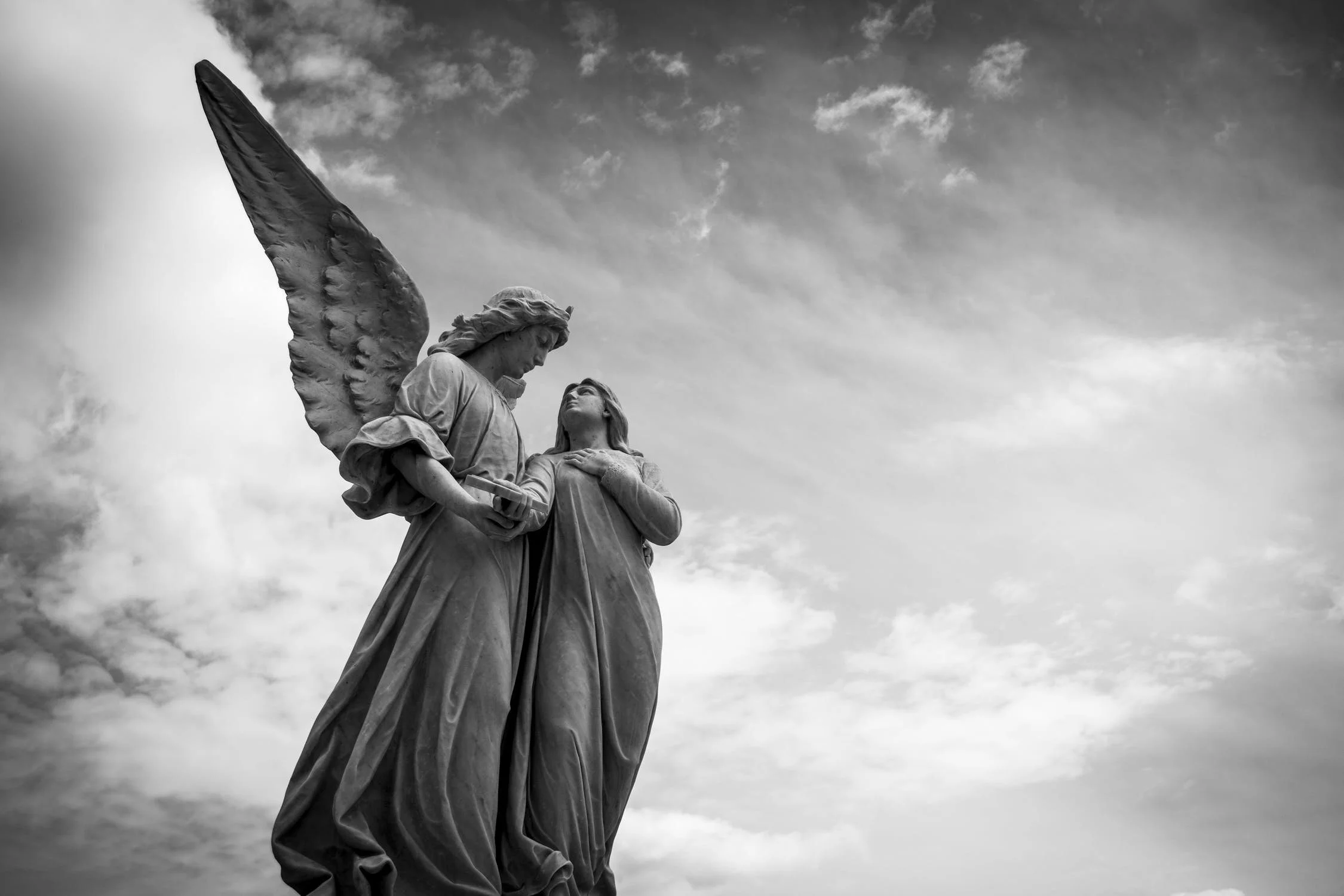Who is God?
Who is God? Most people in the world ask this question, while others choose to ignore it. We believe that there is but one triune God, the creator, sustainer, and ruler of all things, who does all things by the counsel of His own will and for His own glory.
Who is God?
The Triune Nature of God
There is one God (Deut. 6:4; Isa. 45:5) who exists eternally as one being with three eternally distinguishable, personal relations: Father, Son, and Holy Spirit. These three persons of the Godhead subsist coequally and coeternally in one essence (Gen. 1:26-27; Deut. 6:4; Matt. 3:16-17; 28:19; John 1:1-14; 2 Cor. 13:14), united in an eternal relationship of love and mutual glorification (John 8:49, 54; 17:5). These three persons, though equal in essence, are distinguishable by their relationships with one another (John 1:1; 17:5; 2 Thess. 2:13-14; Tit. 3:4-6) and by their functions with respect to one another (John 5:20-23; 8:49, 54; 16:4) and to creation (2 Cor. 13:14; 1 Pet. 1:2). Thus, the nature of God is eternally relational, each person loving the others. The three persons are distinguishable but not separable.
God is personal and therefore has relationships (John 17:5; 1 Pet. 2:9), emotions (Exod. 22:24), thoughts (Isa. 55:8; Rom. 11:34), and a will (Eph. 1:11). He needs nothing external to himself to exist (Exod. 3:14; John 5:26; Acts 17:25). He is separate from his creation (Gen. 1:1; 1 Kgs. 8:27) and yet he is everywhere present and personally involved with his creation (Ps. 139:7-10; Acts 14:17). God is unchanging in his essence, character, promises, and purposes (Mal. 3:6; Heb. 13:8) but he chooses to enter into responsive relationships with his creation and allows himself to change with regard to his attitudes (Deut. 13:17) and relationships (Isa. 59:2). He knows all things past, present and future (Ps. 139:1-6; Rom. 11:33; Isa. 41:22-23) including the future decisions of people (Matt. 26:34) and His power is such that he is able to do whatever he wishes (Deut. 3:24; Ps. 103:19; 135:6). He is a God of immense love and mercy who desires a relationship with his people (Gen. 2; Mic. 7:18; 1 John 4:8) but when his love is rejected he responds with jealousy and wrath (Exod. 20:5; Rom. 1:18; Col. 3:6). He is holy (1 Pet. 1:16) and just (Ps. 89:19) as well as faithful (2 Tim. 2:13), true (Tit. 1:2), and wise (Rom. 11:33-34).
God the Father
God the Father is the first person of the Trinity and as such he possesses the full nature and all the attributes of the Godhead (1 Cor. 8:6; Eph. 3:14-15). Although the triune God as a whole was active in creation (Gen. 1:2; Col. 1:16) and is active in sustaining and directing that creation (Heb. 1:3), the role of the Father is usually emphasized in these areas. God directly created the universe without the use of pre-existing materials (Gen. 1) and he did so toward the end of manifesting his glory (Isa. 43:7; Rev. 4:11). God is the sovereign ruler of his universe (1 Chron. 29:11; Ps. 103:19; 1 Tim. 6:15) and as such he is able to act without any constraint other than his own nature (Isa. 46:10). From before the foundation of the world, he lovingly chooses to bestow the every spiritual blessing upon people whom he foreknows will receive the gift of salvation gracious offered to all (Rom. 8:29; Eph. 1:3-4; 1 Pet. 1:1-2) As the sovereign ruler of the universe, God has an eternal plan (Ps. 33:11; Isa. 25:1; Eph. 1:11) whereby he continually sustains (Col. 1:17; Heb. 1:3), governs (Dan. 5:21; 1 Tim. 6:15), and directs (Isa. 48:17; 1 Sam. 12:18) all creatures and events to his own glory. God will certainly carry out this eternal plan (Isa. 46:10) despite the sinful rebellion of his creation (Gen. 50:20; Neh. 4:15). He does this without being the author or approver of sin (Isa. 6:3-5; Heb. 4:15; Jas. 1:13) or abridging the moral responsibility of his creatures (Jer. 17:10; Rom. 2:5-6).
What is God Like?
The Nature of God
God is self-conscious (Ex. 3:14), self-determining (Eph. 1:11), relational within Himself, (Jn. 14:21), and personal (Ps. 147:4-5; Heb. 11:6). God's partially expresses His essence in certain characteristics including self-existence – dependent on no one or thing for His being, (John 5:26), constancy – unchanging in His being, character, purpose and promise but responsive by His own choice (Num. 23:19; Jer. 18:1-10; Jas. 1:17), infinity – limited only by His own character and decision (Job 11:7-10; Acts 17:28), omnipresence – existing without spatial or temporal limitations (Gen. 21:33; Ps. 139:7-12), omnipotence – having no limit in His power to do what He wills to do (Gen. 17:1-2; Jer. 32:17; Luke 1:37; Eph. 3:20), sovereignty – accountable to no other, doing whatever He pleases (Psa 115:3; Dan 4:35; Eph. 1:11), omniscience – having exhaustive knowledge of all events and persons (Ps. 139; Isa. 44:7-8; Heb. 4:13), spirituality – existing apart from physical body (John 4:24), love -- motivation to give and sacrifice himself based on his own will (Rom. 5:8; 1 John. 4:7-10), righteousness -- total fairness and justice in dealing with his creation (Ps. 145:17), holiness – total purity and moral excellence (Isa. 6:3; 1 John 1:5; Rev. 4:8), benevolence – concern for the welfare of those He loves (Mark 10:18; Jn. 3:16), and grace – giving unmerited favor to his children (Rom. 3:21-25). Each of these attributes is coextensive with the total being of God. Thus the unity of God is affirmed and all the attributes are equally fundamental.
The Trinity
God is inherently and personally relational (Gen. 1:26-27) within His essence (Deut. 6:4). The Father is God (John 6:27), the Son is God (Heb. 1:8), the Spirit is God (Acts 5:3-4), the three persons subsisting within the one divine essence (Matt. 28:19; 2 Cor. 13:14). All three persons of the Trinity have the same essence and are without beginning (John 1:1-3), who execute distinctive but harmonious roles in the economy of redemption (1 Pet. 1:2), the Father being the creator or source (Gen. 1:1), the Son as the mediator or redeemer (1 Tim. 2:5), and the Holy Spirit as the helper or enabler (Jn. 16:7).
The Decree of God
The decree of God is the eternal plan (Dan 4:35; Eph. 1:11) according to which He works out His plan in the course of the world's events (Rom 8:29). Some facets of the decree flow directly out of His own will without possibility of alternative actions (Is. 14:27; Acts 2:23) while others are by His command with the possibility of disobedience (Isa. 1:1-18; Ps. 106:13-15; Acts 14:16). God is the final cause of all but not the efficient cause of all. In particular God is not the efficient cause of sin. Sin is the result of God's gift of free will (Gen. 3) which allowed the rebellion against God's loving command. God's plan is worked out even through such evil acts (Gen. 50:20; Luke 22:22; Acts 2:23). The ultimate purpose is the glory of God (Eph. 1:6; Rev. 4:11).
Election
Before the foundation of the world God, out of His grace and mercy, has sovereignly elected to give some individuals every spiritual blessing in Christ (Eph. 1:3-4; 2 Thess. 2:13-14). For some people, the basis of His election is wholly upon His own purposes (Gen. 12:1-3; Acts 9:3-16; Gal. 1:15). For others His choice is the result of their grace-enabled decision to receive His freely offered gift of salvation in Jesus Christ (John 3:16-18; Acts 16:13-15; 16:30-31). In no case is salvation according to human goodness, human merit or any works done to earn salvation (Eph. 1:5; 2:8-9; 2 Tim. 1:9). All others will be left in their unbelieving state and condemned (Acts 13:46; Rev. 13:8). The ultimate goal is the glory and praise of God. (Eph. 1:6).
Creation
God created the invisible and visible universe (Gen. 2:1; Ps. 33:6; Col. 1:16), the heavens and the earth and all that is in them (Gen. 1:1; Neh. 9:6; Is. 42:5), according to the counsel of His will (Rev. 4:11) and for the purpose of His glory (Is. 43:7; Rom. 11:36). Initially creation was ex nihilo, out of nothing (Gen. 1; Heb. 11:3). God spoke and it was (Ps. 33:6, 9; 148:5). Subsequently He used existent material to create things which could not otherwise have been (Gen. 1:21, 27). Creation is distinct from God, but ever dependent upon His providential sustenance (Is. 42:5; Acts 17:24).
Providence
God preserves His creation by His Word (Col. 1:17; Heb. 1:3). This sustenance is a positive exercise of power with the divinely given, self-preserving character of the creation as a secondary cause. God directs His creation according to His decree in cooperation with all secondary causes (Gen. 45:5; 1 Kings 22:20-30; Is. 10:6). One important example of such secondary causes is prayer (Luke 11:1-13; Acts 12:5-7). In His sovereignty God rules creation so as to secure the accomplishment of His divine purpose. This direction and rule extends even to seemingly insignificant and accidental events (Matt. 10:29-31; Prov. 16:33), to good deeds (Phil. 2:13), and to evil deeds which God limits, frustrates and works among for good (Gen. 50:20; Ps. 33:11; 76:10; Isa. 19:3). The result of providence is patience in adversity, thankfulness in prosperity, and childlike confidence in our heavenly Father.
God the Father
God the Father is particularly the originator of the decree (Ps. 2:7-9), author of election (Eph. 1:3-6), and giver of the Son (John 3:16).
The Attributes and Works of God
The Nature of God
I believe that there is only one God (Deut 6:4; Is. 44:6) and that He eternally exists in three distinct Persons, the Father, the Son, and the Holy Spirit (Matt. 28:19; 2 Cor. 13:14). All three are co-equal in their nature, divine perfections and attributes. All three are co-equal in their existence (Ps. 90:2; Mic 5:2; Heb. 9:14). The persons of the Godhead execute distinct and yet harmonious functions in the administration of the decrees of God (1 Pet 1:2). I believe that God is a personal (Exod. 3:13-14) spiritual being (John 4:24) who is absolutely separate and above His creation (1 Ki. 8:27) and yet everywhere present in creation as its sustainer (Ps. 139:7-10).
The Attributes of God
The attributes of God may be understood as incommunicable (those which have an absolute distinction between God and man) and communicable (which have a measurement of reflection in man). Among His incommunicable attributes are self-existence (John 5:26; Ex 3:13-14), infinite power (Matt. 19:26; Heb. 1:3), infinite knowledge (Is 40:28; Rom. 11:33), infinite presence (Ps. 139:7-10), eternality, without beginning or end (Ps. 90:2), perfection (Deut 32:4; Matt. 5:48), and immutability (Ps. 102:26-27; Jas. 1:17) Among His communicable attributes are holiness (1 Pet. 1:16), righteousness, justice (Ps. 89:14; Rom. 3:25-26), faithfulness (2 Tim. 2:13), truth (Tit. 1:2), goodness (Nah. 1:7), love (1 John 4:8), grace, mercy (Eph. 2:4-5), and wisdom (Rom. 11:33-34).
The Works of God
God has an eternal plan for His universe whereby, according to His will and for His own glory, He has rendered certain by His decrees everything that will come to pass (Isa. 14:26-27; Acts 2:23; 4:27-28). God is the ultimate cause of everything that happens (Isa. 46:9-11; Eph. 1:11) though He is not the direct cause of evil or sin (Jas. 1:13). His will is determinative over all events and the decisions of humans though without constraint or without compromising the free moral agency of men and women (Isa. 44:28). He is completely sovereign over and through the lives of the godly (Rom. 8:28), the lives of the ungodly (Prov. 16:4) nature (Ps. 135:5-7; Jon. 1:17) and even "chance" occurrences (Prov. 16:33).
In His sovereign good pleasure, and on account of no foreseen merit in them, God chose from eternity past a certain number of humans for salvation while passing over those who are not elect (Eph. 1:4-5; Rom. 9:15-18).
God created everything that exists outside of Himself (Acts 17:24, Col. l:16). The creation of the universe and the world was brought into existence initially without the use of pre-existing materials (Heb. 11:3). He spoke all of this into being (Gen 1:3; Ps. 33:8-9) in six days (Ex 20:11) as a free act of His will and for His own glory (Rev. 4:11).
God continues to control and preserve His creation through His divine providence (Ps. 66:7; 135:6), by upholding, directing, and governing all creatures and events (1 Chron 29:11; Ps. 103:19; Col. 1:17).
God the Father
I believe in God the Father, the first member of the Trinity who possesses all the attributes and perfections of the Godhead. He is the source of all that the Godhead is and does, from whom the Son eternally generates (John 1:18; 5:26; 1 John 4:8-9). He is sovereign (Eph. 1:9-11) and His primary purpose is to bring glory and praise to Himself (Rev. 4:9-11). He was active in the work of creation (Ps. 33:6), election (John 6:44), and redemption (2 Cor. 5:18-19). It was His eternal love that motivated Him to send forth His Son, Jesus Christ to die on the cross for the sins of mankind (John 3:16)












